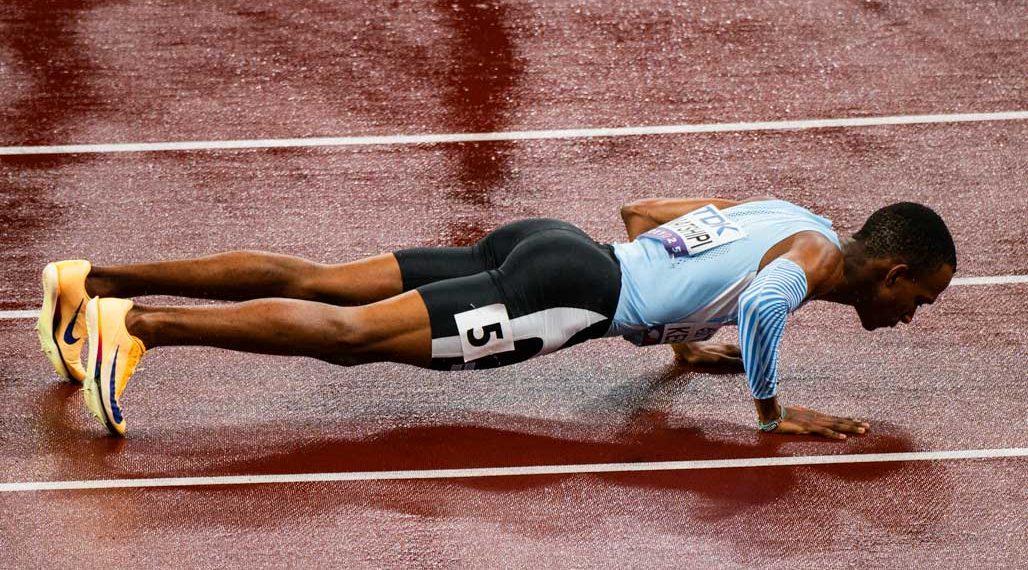Africa-Press – Botswana. The driving rain in Tokyo could not slow the stride of Collen Kebinatshipi. At 21 years old, the tall and fluid runner from Botswana produced the race of his life to win the men’s 400 meters at the World Athletics Championships in 43.53s, a national record and the fastest time run this season. As he crossed the line, he dropped to the track and rattled out some push-ups, a celebration that said as much about youthful confidence as it did about untapped potential.With that run, Kebinatshipi became the youngest male track athlete to win gold at these championships and the first man from Botswana to capture a world title. It was a moment that marked both a personal breakthrough and a national milestone.
The final had a sense of freshness. None of the athletes from the 2023 world final were in the field, and only Trinidad and Tobago’s Jereem Richards carried experience from last year’s Olympic showdown. Olympic champion Quincy Hall never made it to Tokyo because of injury, while other recent medalists, including Britain’s Matt Hudson-Smith and Zambia’s Muzala Samukonga, failed to qualify. What remained was a field of rising names and a chance for new stories to be written.
Kebinatshipi had shown his ability in earlier rounds, but finals on the biggest stage have their own character. From the gun, he attacked the stagger, powering through the first 200m with long, efficient strides. By the top of the home straight, he had carved out a lead that would not be surrendered. Richards, drawn in lane two, closed hard over the last 50 meters, but the young Botswana runner kept form and pace to win by nearly two tenths of a second.
Richards was rewarded with silver in 43.72, a national record and the first time he had broken through on the global stage since his 200m bronze in 2017. Botswana’s Bayapo Ndori secured bronze in 44.20, adding further weight to what has become a striking surge for the country in one of track’s most demanding events. Jamaica’s Rusheen McDonald fought bravely before fading to fourth, while South Africa’s Zakithi Nene, who entered as the world leader at 43.76, slipped back to fifth after a bold opening half.
For Kebinatshipi, the performance was the culmination of spending the last two years in the shadow of teammates. He had earned medals on the global stage in the 4x400m relay, including silver at the Paris Olympics alongside Ndori and 200m champion Letsile Tebogo, but he had missed the individual Olympic final by a single place. In Tokyo, there was no hesitation. “After the semifinal, I told myself I could do better,” he said afterward. “The medal was a bonus, but to run the national record and a world lead is fantastic.”
His confidence carries weight. Born in 2004, Kebinatshipi is part of a new generation of Botswanan athletes stepping onto the international stage. The country, long viewed as an outsider in sprinting, has begun to establish a reputation through names like Tebogo, Ndori, and now Kebinatshipi. Having three men in the 400m final was proof of that momentum. For the first time, a small Southern African nation found itself shaping the narrative in an event where the United States has historically dominated.
The rain added drama to the evening, soaking the track and tightening the inside lanes. That made Richards’ silver medal all the more impressive, but it also highlighted the poise of Kebinatshipi, who never broke stride under the pressure of a championship final. His splits were balanced, his stride light, his finish authoritative. When he stopped the clock at 43.53, he placed himself 10th on the all-time list.
The presence of stories like that of Jacory Patterson, who reached the final despite supporting himself with work as a package handler at UPS, added further color to the event. Patterson finished seventh in 44.70. For Kebinatshipi, the night was a confirmation that he belongs among the very best.
Richards, reflecting afterward, admitted the silver carried pride even if it fell short of his ultimate goal. “I’ve been working for this since 2017,” he said. “To break the national record in a final like this is a dream, and to do it in Tokyo means a lot.”
For Botswana, the celebrations are likely to last well beyond Tokyo. Kebinatshipi’s win adds another name to a growing list of track athletes pushing the nation forward. His blend of youth, strength, and composure points to an athlete who could shape the future of the 400m.
For More News And Analysis About Botswana Follow Africa-Press






